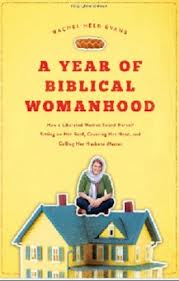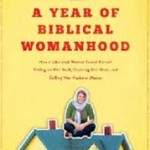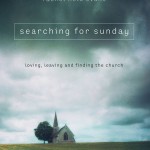 For those of you have have read my blogs over the past year or so, I am about to beat on a familiar drum. And I am going to keep beating it, because I think its a huge point that gets overlooked.
For those of you have have read my blogs over the past year or so, I am about to beat on a familiar drum. And I am going to keep beating it, because I think its a huge point that gets overlooked.
Rachel Held Evans’s recent book A Year of Biblical Womanhood has inspired some strong reactions in certain American Christian subcultures. The main point of the book is to critique the phrase “biblical womenhood,” and the expectations of women surrounding this phrase, by engaging in a witty and entertaining way what the Bible says about woman. Evans seems concerned to point out that being a “biblical woman” involves much more than obedience to certain verses in the Bible (featured most prominently for Evans is the common abuse of Proverbs 31:10-31).
Of course, most Christians–conservative or not–are aware of this in principle, but Evans’s experience, which certainly mirrors the experience of many other American Christian women, is that when it comes to talking about women, passages from the Old and New Testaments are whipped out willy-nilly as proof for what God wants a Christian woman to look like. The examples Evans gives from her own fundamentalist subculture of her youth and from highly influential public leaders like John Piper, Wayne Grudem, and Mark Driscoll are anywhere from comical to disturbing.
No, not every evangelical or fundamentalist engages in these extremes, but anyone with any familiarity with these subcultures will know her observations have a ring of truth to them, and it is high time someone from the inside steps up to these bullies.
So, as I said in my review from a couple of says ago, Evans is not bashing the Bible, as some continue to insist, but a dominant voice of an influential American Christian subculture that has used the Bible in destructive ways.
But here is the question that keeps ringing in my ears: “Why has this one person with this idea caused such a stir?” After all, books and ideas a whole lot more destructive, by any reasonable notion of the word, are uttered daily for Christians to get worked up about (sex-trafficking, poverty, torture). So why do we see reviewers getting so focused about what one person thinks about “biblical womanhood” and resorting so quickly to condescension and destructive rhetoric? (In addition to misunderstanding some hermeneutical issues, that is my general assessment of two recent reviews here and here)?
To be sure–and let me be perfectly clear–to write is to be criticized, and Evans is fair game. Competent reviews will always point out blind spots and the shortcomings of any book. One can legitimately critique A Year of Biblical Womanhood on various levels, and Evans, like any author, would benefit from them. But why is the heat turned up so high so quickly? It seems that for some, if Evans is not neutralized quickly, the gospel itself is in danger of collapse.
I am not immune to overreacting when I disagree with someone about things I feel I have thought a lot about and formed firm opinions on. And when that happens, I have learned to stop myself and ask, “What is at stake for you here that brings up such a visceral reaction?”
I know that sounds like silly, pop-psychology mumbo-jumbo to veterans of theological conflict, who have learned to “contend for the faith” at all costs, regardless of consequences, damn the collateral damage to human beings. But that’s just too bad. The truth is that, when it comes to our faith in God, how we see ultimate reality and our place in it, we have a lot at stake–and losing that or seeing it “attacked” is unsettling and we tend to react.
The core theological issue at stake for many of Evans’s harsher critics is, nor surprisingly, biblical authority and inerrancy–even if they do not phrase it this way. Especially for conservative American Protestants, their entire system of belief rests on being able to trust the Bible as God speaking to them directly (or by inference) about matters of faith and life, which includes things like “What does God expect of women?”
What lies behind this frame of mind is a genuine, though broken, desire to obey the creator and redeemer–the God of Israel, and the Father of Jesus Christ. I say “broken” because all of our efforts to live in harmony and communion with God are hampered–not from straying from supposed universally accepted hermeneutical methods, as one of Evans’s critics complains–but by the simple fact that we all, myself and Evans’s critics included, think of God through our own cultural lenses, and too often uncritically so. And so God happens to wind up looking an awful lot like ourselves (as Durkheim famously observed 100 years ago). (As someone once quipped–and the quote has been variously phrased and attributed to various people: “God created man, and we have been returning the favor ever since.”)
The theologically humble and self-aware Christian will be on the look out for where the biblical witness and cultural conformity are melded together and labelled “biblical”–and this, as I see it, is the central point Evans is making in her book. She is standing up to powerful ecclesiastical bullies, self-proclaimed gatekeepers who are quick to level the charge “unfaithful to the Bible” to those within earshot. She is showing them, with wit and insight, that their game collapses rather quickly. (As a side note, I might suggest that Evans follows up with a book that focuses on reconstructing biblical womanhood according to her theological and hermeneutical vision–even though she already does some of this in her book.)
As I see it, here is the real problem some recent online reviewers have of A Year of Biblical Womanhood. It is not really a failure to follow proper hermeneutical procedure, or Evan’s incompetence or ignorance of church history, or similar criticisms. These sorts of criticisms could easily be aimed right back at the reviews I have read.
The core issue is that Evans’s conclusions undermine theological systems for which biblical inerrancy–which carries with it a strong tendency toward literalism, albeit on a spectrum–is the non-negotiable theological foundation. That is what motivates her critics. After all, Christian books are published daily that exhibit fairly superficial and quite dim-witted theological and hermeneutical engagement that these critics would not take the time to critique because the premises and conclusions of the authors are generally or wholly agreeable to them. The “reviews” of A Year of Biblical Womanhood, are really veiled defenses of an unstated theological substructure.
It does not help to calm things down that Evans has no academic degree to back her up, no ecclesiastical or institutional imprimatur, and no powerful donor funding her time. She is alone with her thoughts and keyboard and writes books that sell like sunscreen in the Arizona desert, is interviewed on national TV, has a massive following on her blog, speaks at conferences, and is seen as an articulate voice for a growing number of readers. (In my more cynical moments, I might even think there is a bit of professional jealousy involved.) So–Evans is not only wrong, but she is in a position of “leading people astray” (the very phrase presumes the inviolability of the critic’s theology).
Again, let me be perfectly clear: no book is immune from critique, including Evans’s, and pointing out shortcomings ultimately helps the conversation along. (In my own brief review I could have chosen to spend some time registering where I might have handled some passages differently, or have different hermeneutical or theological categories for certain issues. For example, I agree with some others that the literalism of Evans’s opponents would have been effectively undercut by emphasizing New Testament trajectories–though this, too, would extract a pound of flesh from inerrantists, given the hermeneutical maneuvers employed by the New Testament authors, but that is another blog post or two entirely.)
I chose, however, to try to keep the forest in view and not get lost in the trees: the Bible is too commonly mishandled and to the harm of everyday Christians. At the end of the day, regardless of what some might think of Evans’s strategy to get there, this is her goal.
I would like to see Evans’s critics more genuinely acknowledge the necessity of her critique, and maybe even use their power and influence to join Evans in calling influential public figures to account for their own theological and hermeneutical shallowness and the harm that results, rather than supporting them through silence and leaving to job to a relatively young woman who happens to have the courage to speak up.











